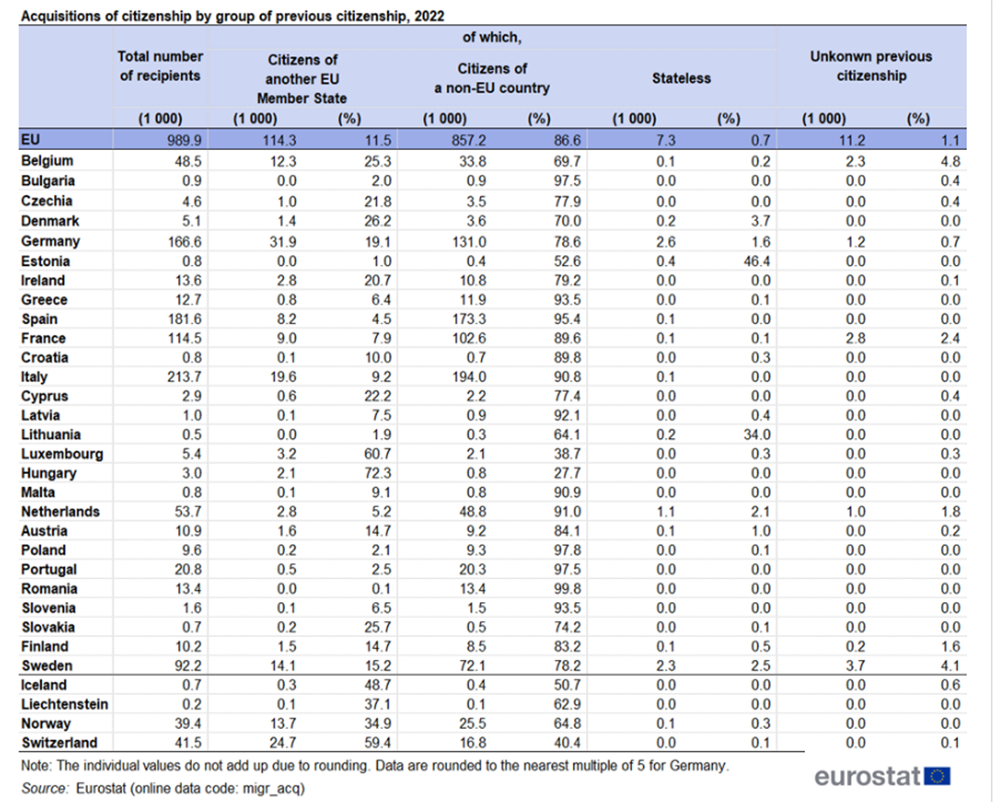Statistics published by the European Commission last week showed that almost one million people had been granted citizenship in the 27 member states in 2022. The actual figure was 989,900 and represented a 20% increase on 2021.
Correction: The value for Italy is 4.2 citizenships granted per 100 non-national residents. Please refer to the bar chart below. pic.twitter.com/nDjxPjMgI4
— EU_Eurostat (@EU_Eurostat) February 29, 2024
As we will see, a deeper look at the information shows that the Irish state differs quite radically from the rest of the EU in terms of the main countries of origin of those who are granted citizenship.
13,600 people were granted citizenship in the Irish state in 2022, and that increased to more than 18,000 in 2023. At the last ceremonies held in 2023, on December 18 and 19, 6,000 people from 131 different countries were conferred with citizenship. That brought the total since the beginning of 2013 to over 120,000.

The breakdown of where those being granted citizenship originate shows differences between the member states. The Irish state differs quite markedly in this, as it does and as we have previously shown in relation to the countries of origin of people claiming asylum here and having been allowed to remain in the state.
87% of those granted citizenship by EU states in 2022 were from countries outside of the EU. The Irish state was below that average with 79.2% of “new Irish” citizens having previously been citizens of a country outside of the EU. Hungary and Luxembourg were the only member states whose new citizens were mostly former citizens of other member states. They comprised 72.3%. of conferrals in Hungary.

As noted above, what is also interesting is that the Irish state differs quite radically in the main countries of origin of those who are granted citizenship.
In the whole of the EU the top five countries of origin, in order, were Morocco, Syria, Albania, Romania and Turkey. None of those countries feature in the top ten of countries of origin here, and only one, Syria, is in the top five of non-EU countries of origin here.
Ireland’s top five origin countries in that category are: The UK, India, Pakistan, Nigeria, and Syria.

There are historical and linguistic and even family reasons why former citizens of the United Kingdom feature so prominently especially since Brexit. 1,300 former citizens of the UK were given Irish citizenship in 2022.
(The fact that English-speaking Africans seem to regard Ireland as little different to the UK culturally may similarly account for some of the number of asylum seekers arriving for whom this country appears to be a magnet.)
Former citizens of Nigeria and Pakistan do not feature in the top listings of those granted citizenship of any other EU state than Ireland. The Irish state had the fourth highest number of Nigerians who were conferred with citizenship in 2022 – while Nigeria ranked just 25th in the list for the other 26 EU member states.
More than 1,000 former citizens of Pakistan were granted citizenship in Ireland in 2022, despite there having been a more than 85% rejection of initial applications for asylum from persons claiming to be from Pakistan here in 2022.
Likewise, 800 people of former Nigerian citizenship were conferred with Irish citizenship in 2022 despite a high rate of rejection of appeals for asylum, which was 85% in 2022 with just over a third being accepted on appeal.
Another anomaly in the Irish figures is related to age profile. While 58.7% of all those conferred with citizenship in the EU in 2022 were aged 34 or younger, the corresponding figure for the Irish state was just over one third, at 33.9%.
Those aged 45 and older accounted for just 20% for the EU 27, but 27.2% in Ireland. That somewhat conflicts with the narrative of immigrants being required to pay for an aging demographic.
Irish citizenship is recognised as one of the easiest to obtain, and one of the few that allow citizenship to be granted after a relatively short period of residence. Applications can be made after living in the state for one continuous year, and with proof of four cumulative years of residence over the preceding eight years.
So you could have spent four of the nine years previous to qualifying for citizenship living outside of the country.
There are of course no tests regarding language, nor even of proficiency in English and Irish citizens of foreign birth have regularly appeared in court with the need of translators.
Which is a rather absurd situation all things told. One wonders exactly what conception of “Irishness” – if that in itself is not an offensive concept – exists in the minds of administrators whose bottom line is clearly what is good for business is good for the country.
All of the prevailing conditions have led to Irish citizenship being counted among the very easiest to acquire according to the World Population Review. In the illustrious company of Paraguay, Antigua, Saint Luci and Saint Kitts and Nevis.